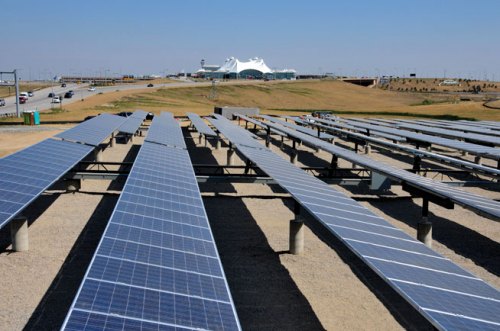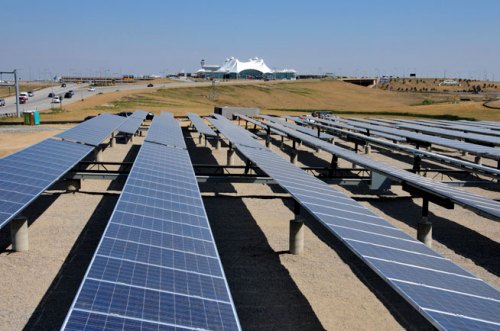 After taking California by storm, Chinese solar companies are moving on to places like Denver’s international airport.Photo: WorldWater & Solar TechnologiesCarbon neutral jumbo jets may be a long way off but some airports are making strides in cutting their greenhouse gas emissions.
After taking California by storm, Chinese solar companies are moving on to places like Denver’s international airport.Photo: WorldWater & Solar TechnologiesCarbon neutral jumbo jets may be a long way off but some airports are making strides in cutting their greenhouse gas emissions.
Denver International, for instance, announced Tuesday that it will install a 4.4-megawatt solar array, more than doubling the 2 megawatts’ worth of photovoltaic panels the airport built in 2008. Earlier this year, Denver signed a deal for a third array, which will generate an additional 1.6 megawatts of electricity.
Yingli Green Energy is providing the 19,000 panels for the 4.4-megawatt project. A Yingli spokesperson told me that altogether, the photovoltaic arrays will supply on average about 6 percent of the airport’s electricity demand. But on days when the sunshine is intense, the solar farm would generate enough electricity to meet nearly a third of Denver International’s electricity needs.
When completed in 2011, the 4.4-megawatt installation will be Colorado’s largest commercial solar project. But what’s really notable is the photovoltaic module maker supplying the solar panels, Yingli.
The Chinese company only entered the United States in 2009 and by that year’s end had captured nearly a third of the California solar market, the bright star of the U.S. solar system. Low-cost Chinese solar companies now supply almost half the California market, according to Bloomberg New Energy Finance, a consulting and research firm.
The Denver deal is another sign that Yingli and other Chinese solar panel makers are shaking up the U.S. market as they move beyond their California base.
In other news, another relatively little-known Chinese firm, Solarfun, said Monday it struck a deal to supply 9.5 megawatts’ worth of solar modules to Martifer Solar, the U.S. subsidiary of a Portuguese renewable energy company, which will install them at projects in California and Colorado.
“Solarfun is focused on the U.S. market as one of our primary growth drivers going forward and we expect Martifer to be a key partner as we continue to build market presence and share,” Bruce Ludemann, the vice president and general manager of Solarfun’s North American operations, said in a statement.
Such success may cause consternation in the executive suites of rivals from Bonn to Silicon Valley, where low-cost Chinese manufacturing is forcing competitors to become even more efficient and maintain their technological edge.
But in the end, the China’s ability to secure such large deals shows that the solar market truly is taking off.


